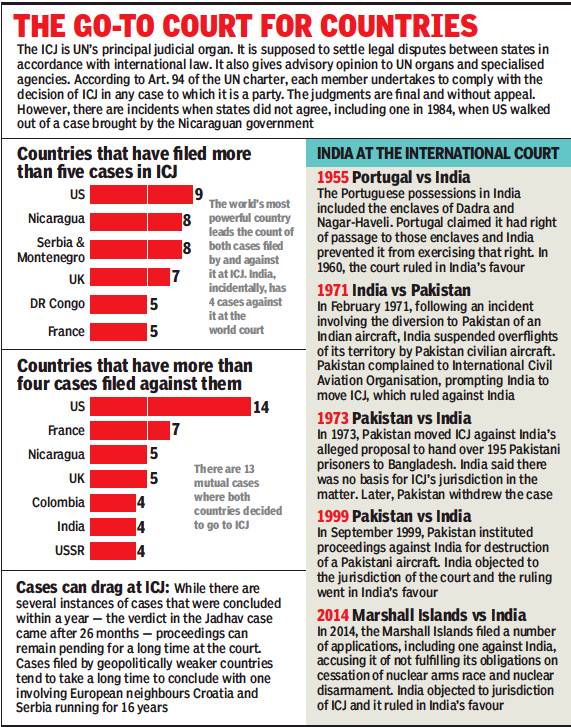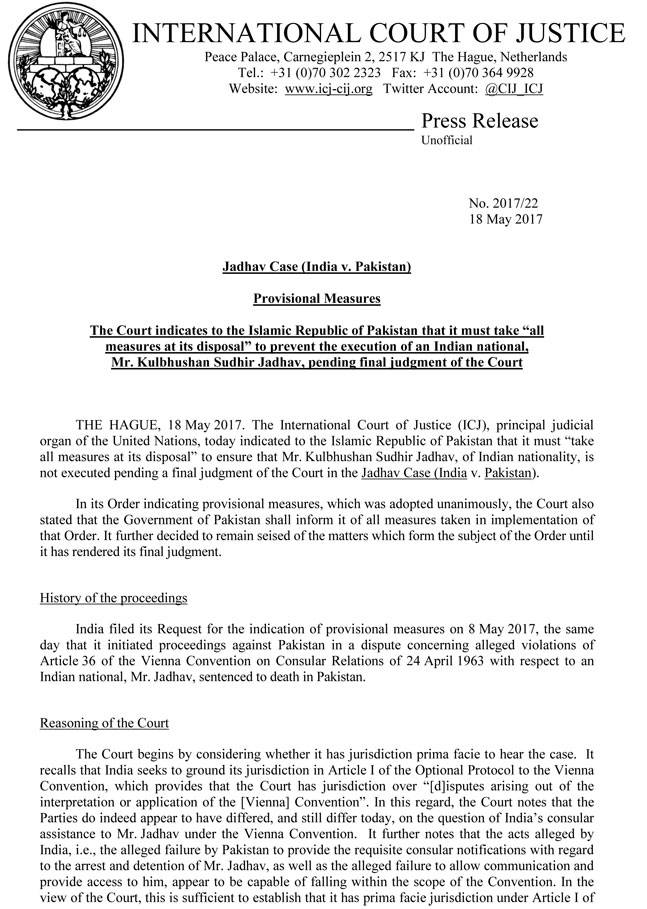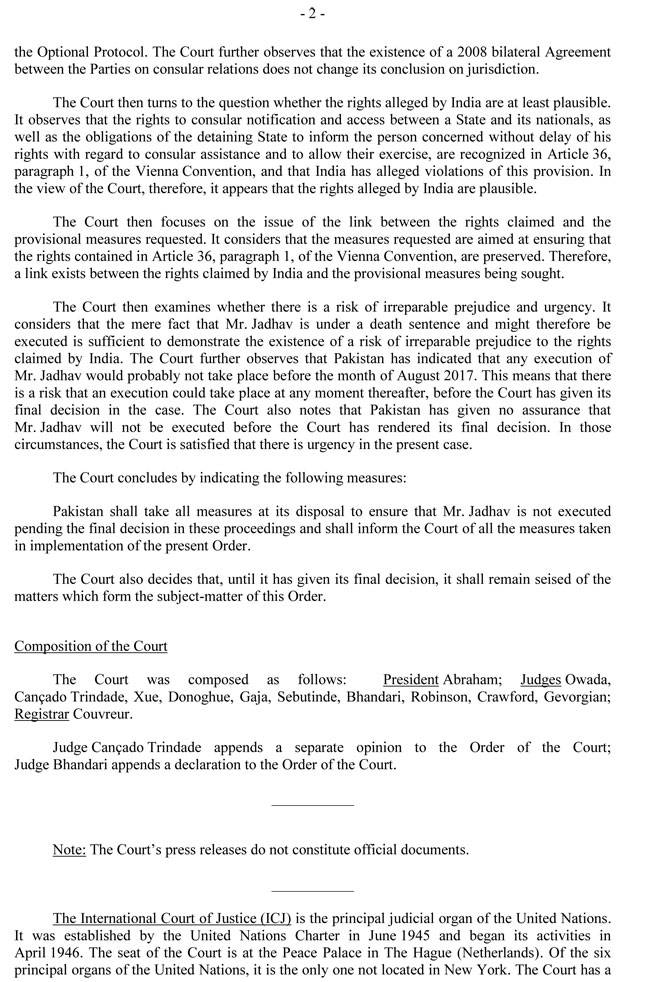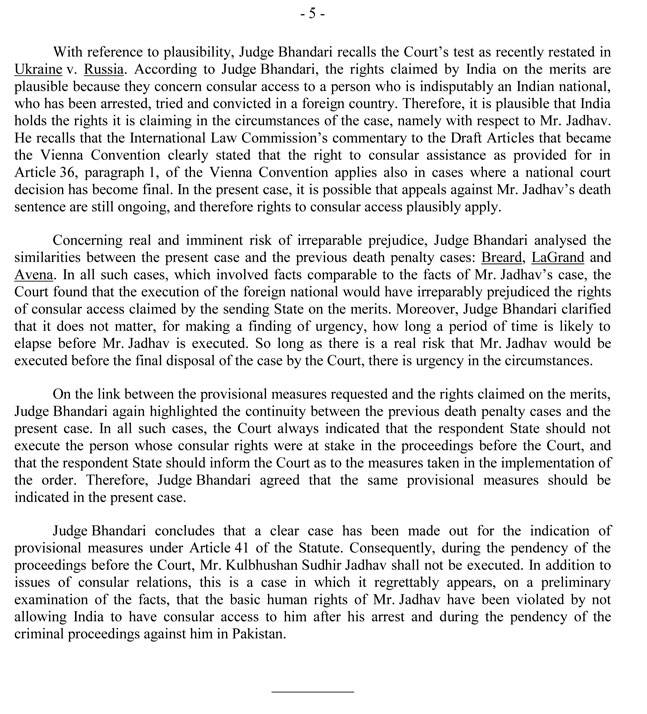International Court of Justice and South Asia
| Line 6: | Line 6: | ||
|} | |} | ||
| − | + | ||
| − | [[ | + | |
| − | + | ||
| + | =The ICJ and South Asia= | ||
| + | ==1955-2014== | ||
| + | [[File: International Court of Justice; The ICJ and South Asia.jpg| International Court of Justice <br/> The ICJ and South Asia <br/> From: [https://epaper.timesgroup.com/Olive/ODN/TimesOfIndia/shared/ShowArticle.aspx?doc=TOIDEL%2F2019%2F07%2F18&entity=Ar01401&sk=B3D03FCB&mode=text Sachin Parashar, July 18, 2019: ''The Times of India'']|frame|500px]] | ||
| + | |||
| + | '''See graphic''': | ||
| + | |||
| + | '' International Court of Justice <br/> The ICJ and_South_Asia '' | ||
=India vs Pakistan= | =India vs Pakistan= | ||
| Line 164: | Line 171: | ||
=See also= | =See also= | ||
[[International Court of Justice and India]] | [[International Court of Justice and India]] | ||
| + | |||
| + | [[Category:India|I | ||
| + | INTERNATIONAL COURT OF JUSTICE AND SOUTH ASIA]] | ||
| + | [[Category:Law,Constitution,Judiciary|I | ||
| + | INTERNATIONAL COURT OF JUSTICE AND SOUTH ASIA]] | ||
| + | [[Category:Pakistan|I | ||
| + | INTERNATIONAL COURT OF JUSTICE AND SOUTH ASIA]] | ||
Latest revision as of 12:57, 3 January 2021
This is a collection of articles archived for the excellence of their content. |
Contents |
[edit] The ICJ and South Asia
[edit] 1955-2014

The ICJ and South Asia
From: Sachin Parashar, July 18, 2019: The Times of India
See graphic:
International Court of Justice
The ICJ and_South_Asia
[edit] India vs Pakistan
[edit] Breguet Atlantique, 1999
Dhananjay Mahapatra, Best of both worlds for India: Sorabjee, May 19, 2017: The Times of India
Former attorney general Soli Sorabjee was delighted with ace lawyer Harish Salve's success in convincing ICJ to direct Pakistan not to carry out Kulbhushan Jadhav's execution.
While Salve's arguments convinced ICJ that it had jurisdiction to entertain India's plea in the Jadhav case, Sorabjee had done just the opposite by convincing the court it had no jurisdiction to entertain Pakistan's plea against India.
On September 21, 1999, Pakistan had moved the ICJ with a plea to declare India responsible for downing its naval patrol plane, Breguet Atlantique, over the Rann of Kutch on August 10, 1999, months after the Kargil war. The IAF had dow ned the plane on the ground that it had violated Indian airspace and didn't turn back despite repeated warnings.
The ICJ on June 21, 2000 gave its verdict rejecting Pakistan's plea on the ground that the matter was covered by bilateral treaties between the two countries and those tools should be explored for settling the dispute.
By a 14-2 verdict, the ICJ had ruled in favour of India and said, “As regards India and Pakistan, that obligation was restated more particularly in the Simla Accord of July 2, 1972. Moreover, the Lahore Declaration of February 21, 1999 reiterated `the determination of both countries to implementing the Simla Agreement'. Accordingly , the court reminds the parties of their obligation to settle their dis putes by peaceful means, and in particular the dispute arising out of the aerial incident of August 10, 1999, in conformity with the obligations which they have undertaken.“
Salve's success also brought back fond memories to Sorabjee. Salve began his ca reer in law as a junior to Sorabjee and, incidentally , during the NDA government headed by Atal Bihari Vajpayee, both were top law officers for India -Sorabjee was the attorney general and Salve the solicitor general.
Sorabjee told TOI, “In the Atlantique case, I as attorney general, successfully questioned the ICJ's jurisdiction in view of the reservations of India against Pakistan approaching the ICJ despite availability of bilateral mechanism for settling of the dispute.
In the Jadhav case, Salve has successfully argued for India that ICJ has jurisdiction to intervene alleging gross violation of Vienna Convention on Consular Access. Apparently , no two cases are same on facts, and apparently , India is having the best of both worlds.“
[edit] 1999: Pakistani aircraft in Indian air space
Shashank Shantanu, May 15, 2017: India Today

India, Pakistan face-off at ICJ after 18 years in 2017: When India had shot down a Pakistani aircraft in 1999
The last time when India and Pakistan were at the International Court of Justice (ICJ) was in 1999 when Indian Air Force had shot down a naval aircraft of Pakistan.
The face-off between bitter neighbours India and Pakistan at the International Court of Justice (ICJ) over Kulbhushan Jadhav's death sentence comes 18 years after the two countries were at the world court.
In 1999, the Indian Air Force (IAF) shot down Pakistan's maritime reconnaissance aircraft Atlantique in the Kutch region of Gujarat. All 16 people on board the Pakistani aircraft were killed.
Pakistan had approached the ICJ claiming that the plane was shot down by India in its airspace and demanded 60 million dollar in compensation from New Delhi. However, the ICJ had then rejected Pakistan's petition saying it had no jurisdiction.
WHAT HAPPENED ON AUGUST 10, 1999
1. It was 11 am when the Naliya Air Force Station in Gujarat was informed about a suspected aircraft violating Indian air space. The IAF decided to investigate the unidentified aircraft.
2. Two MiG 21s took off to look into the skies for the 'intruder' plane. The Indian fighter jets confronted a Pakistani Atlantique reconnaissance aircraft.
3. The Pakistani aircraft was asked to land at the Naliya air base immediately. Neglecting the warnings by Indian jets, the Pakistani aircraft tried to move ahead and veered sharply towards the border.
4. The Atlantique did just what it shouldn't have done. Veering sharply is seen as a 'combative gesture' in air force parlance. The pilot of one of the MiGs relayed the happening to the ground control at the air base.
5. Moments later his ear piece crackled with an order to shoot. And the next minute, a heat-seeking air-to-air Matra missile had pierced into the Pakistani aircraft. The aircraft burst into flames killing 16 people on board. The wreckage of the aircraft was found spread across the Kori Creek wasteland.
[edit] 2017: Kulbhushan Jadhav Case
The 11-judge bench of the International Court of Justice (ICJ) at The Hague unanimously agreed to accept India's plea against Pakistan's death sentence to Kulbhushan Jadhav.
The bench led by Judge Ronny Abraham asked Pakistan not to execute Kulbhushan Jadhav till the final verdict in the case is not pronounced by the International Court of Justice.
HERE IS HOW THE INTERNATIONAL COURT OF JUSTICE DECIDED IN INDIA's FAVOUR:
QUESTION 1: JURISDICTION TO HEAR THE CASE
The ICJ began by considering if it has jurisdiction to hear the case. The Court said that India sought its jurisdiction under Article 1 of the Optional Protocol of the Vienna Convention under which the Court has jurisdiction in "disputes arising out of the interpretation or application of the Vienna Convention". The Court said that both parties, India and Pakistan, have differed on the question of India's consular assistance to Kulbhushan Jadhav under the Vienna Convention. The Court noted that the acts alleged by India--Pakistan's failure to provide the requisite consular notifications with regard to arrest and detention of Jadhav--appear to be falling within the scope of the Vienna Convention.
The Court said this was sufficient to establish that it has prima facie jurisdiction under Article 1 of the Optional Protocol. The ICJ also observed that the existence of a 2008 bilateral agreement between the parties does not change its conclusion on jurisdiction.
QUESTION 2: IF THE RIGHTS ALLEGED BY INDIA ARE PLAUSIBLE
The Court observed that rights to consular notification and access between a State (India) and its nationals, as well as the obligations of the detaining State (Pakistan) to inform the person concerned without delay of his rights are recognised in Article 36 ( paragraph 1) of the Vienna Convention. India has alleged violations under this provision. The ICJ said that it appears that the rights alleged by India are plausible.
QUESTION 3: IF THERE IS A LINK BETWEEN THE RIGHTS CLAIMED AND PROVISIONAL MEASURES REQUESTED
The ICJ said that the measures requested are aimed at ensuring that the rights contained in Article 36, paragraph 1, of the Vienna Convention are preserved. The Court observed that a link exists between the rights claimed by India and the provisional measures being sought.
QUESTION 4: IF THERE IS A RISK OF IRREPARABLE PREJUDICE AND URGENCY
The Court said that the mere fact that Kulbhushan Jadhav is under a death sentence and might therefore is executed is sufficient to demonstrate the existence of a risk of irreparable prejudice to the rights claimed by India.
The ICJ then observed that Pakistan has indicated that any execution of Kulbhushan Jadhav would probably not take place before August 2017. This means, the Court said, that there is a risk that an execution could take place any moment thereafter, before the Court has given its final decision in the case.
The ICJ noted that Pakistan has not given any assurance that Kulbhushan Jadhav will not be executed before the Court has rendered its final decision. Under such circumstances, the Court said that is satisfied that there is urgency in the present case.
COURT's ORDER TO PAKISTAN
The Court asked Pakistan to take measures at its disposal to ensure Kulbhushan Jadhav is not executed pending the final decision in the case, and that it will inform the Court of all the measures it has taken to implement the order.
HERE IS THE FULL TEXT OF THE ICJ ORDER:








See pictures:
A copy of the International Court of Justice order in Kulbhushan Jadhav case: Page-1
A copy of the International Court of Justice order in Kulbhushan Jadhav case: Page-2
A copy of the International Court of Justice order in Kulbhushan Jadhav case: Page-3
A copy of the International Court of Justice order in Kulbhushan Jadhav case; The concurring opinion of Judge Cancado Trindade: Page-1
A copy of the International Court of Justice order in Kulbhushan Jadhav case; The concurring opinion of Judge Cancado Trindade: Page-2
A copy of the International Court of Justice order in Kulbhushan Jadhav case; The concurring opinion of Judge Cancado Trindade and the declaration by an Indian judge in the ICJ: Page-3
The declaration by an Indian judge in the ICJ bench: Page-4
The declaration by an Indian judge in the ICJ bench: Page-5
[edit] Pakistan’s stance
[edit] 2018: Pakistan votes in favour of compliance with ICJ’s Avena judgment
Pak Voted In UN For ‘Avena’ Verdict
Did Pakistan just score a self-goal in the Kulbhushan Jadhav case? In what is likely to provide India fresh ammunition in the case, Islamabad has voted at the UN in favour of an International Court of Justice (ICJ) judgment which was one of the mainstays of India’s submissions before the ICJ when it challenged the death sentence and denial of consular access to the alleged Indian spy.
India had in its submission quoted copiously from the 2004 ‘Avena and Other Mexican Nationals’ judgment in which the ICJ held the US guilty of violating the Vienna Convention on Consular Relations by denying Mexico consular access to its citizens sentenced to death.
TOI has learnt that Pakistan last week voted along with 68 others, including India, in favour of a UN resolution urgently calling for “full and immediate” compliance with the ICJ’s Avena judgment. After 14 years, the US is yet to implement the ICJ order.
The ICJ is the principal judicial organ of the UN. The Jadhav case will come up for hearing in February 2019 before the ICJ which had last year stayed Pakistan’s death sentence to Jadhav pending its final decision on the legal proceedings. India, official sources said, will bring up Pakistan’s vote in favour of the Avena judgment before ICJ.
“The question for Pakistan is if it wants implementation of the Avena judgment, which is central to India’s position, what stops it from following a similar ICJ ruling in the Jadhav case,” said a government source, adding that Pakistan’s vote also contradicted its position that the court had no jurisdiction over the Jadhav case.
The ICJ had backed India’s contention that the Vienna Convention on Consular Relations had been violated by not allowing India consular access to Jadhav. Pakistan, though, has so far not allowed India consular access, arguing in its counter-memorial before ICJ that Vienna Convention was not applicable in the case of Jadhav who, it claimed, was a serving Indian Navy officer and RAW spy.
In his submission, which led to the ICJ staying Jadhav’s death sentence, India’s counsel Harish Salve had recalled the court’s observation in the Avena case that “violations of the rights of the individual under Article 36 (Vienna Convention) may entail a violation of the rights of the sending state, and that violations of the rights of the latter may entail a violation of the rights of the individual”.
Salve had argued that the Vienna Convention recognised the right of a state to seek redress on behalf of its national in the ICJ, where the “rights of its national, and concomitantly its own rights under the Vienna Convention are violated by another state”.
Even Pakistan’s counsel had acknowledged that there were “parallels of that (Avena)” in the position adopted by India. And the ICJ itself had cited its Avena judgment while ruling in the Jadhav case that the fact that he could apply for clemency, or that no date had been fixed for executing him, were not “per se circumstances that should preclude the court from indicating provisional measures”. The Avena judgment had also come in handy for the Indian counsel in proving emergency in the case.